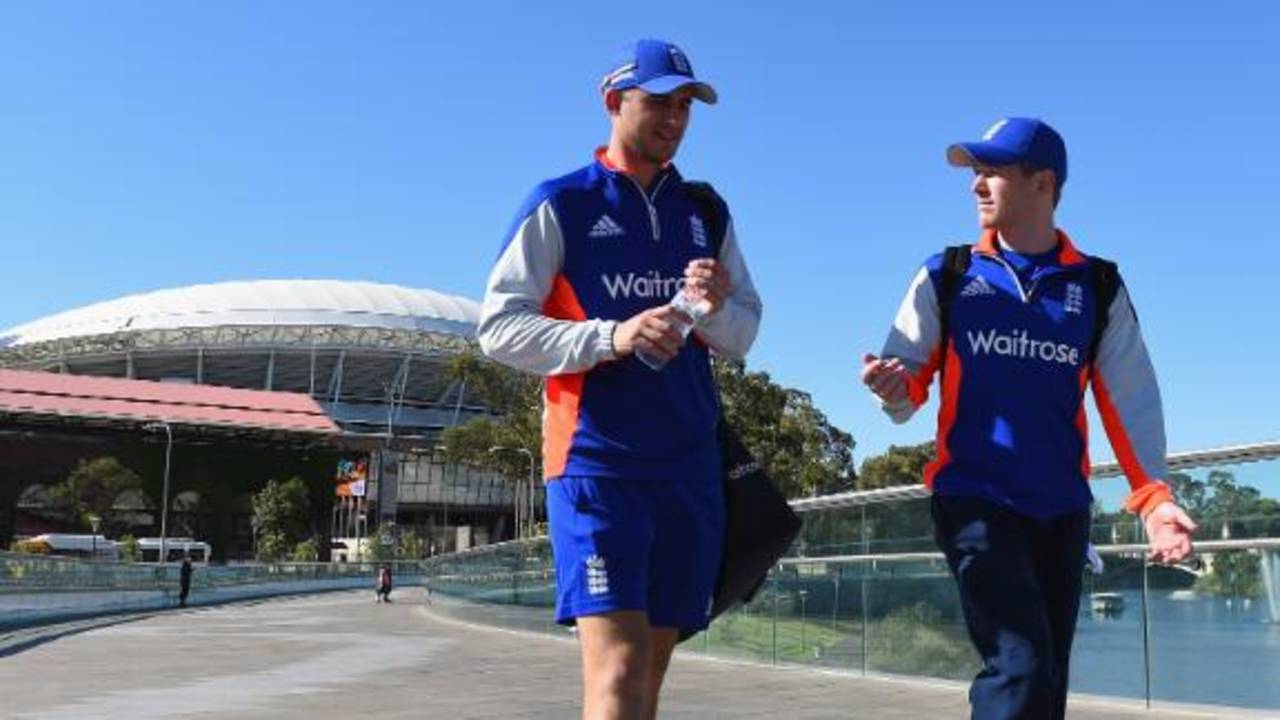England enter do-or-die territory
After what seems like months of sound and fury that have signified very little, England move into a different stage of the World Cup: from now on, every game they play is a must-win
George Dobell
Mar 7, 2015, 8:39 AM
At last the phoney war is over.
After what seems like months of sound and fury that have signified very little, England move into a different stage of the World Cup: from now on, every game they play is a must-win.
At first glance, you might conclude they still have an excellent chance of reaching the quarter-finals. Their opponents are unfancied Bangladesh and Afghanistan, after all.
But such is England's plight, they could win both games and still fail to progress if Bangladesh beat New Zealand. And England's recent record against Bangladesh - who have won two of the last three ODIs between the teams including the meeting in the 2011 World Cup - is not hugely encouraging.
So England, who have experienced an error-strewn campaign so far, have no further room for error.
There have been some flashes of encouragement. England have scored 300 in successive games - something they had only achieved three times previously in 1983, 1992 and 2011 - Joe Root is batting magnificently, Jos Buttler looked in good form against Sri Lanka and Moeen Ali is bowling nicely. In the nets at least, Eoin Morgan also appears to have turned a corner and is suddenly batting with far more fluency.
But, such has been the manner of the three defeats they have suffered, that such factors are bound to be over-looked. Nobody recalls the excellent catering on Titanic.
Of most concern has been the lack of contribution of England's two senior bowlers. The pitch map of James Anderson and Stuart Broad this World Cup resembles a Seurat painting - blotches everywhere - with Eoin Morgan admitting the short length they have bowled has been a result of human error more than a tactic. Both will be instructed to pitch much fuller in Monday's game.
"It's not been a policy or a tactic," Morgan said. "It is an area we are looking to improve on. Our bowling was a bit of a concern.
"It can be difficult when a partnership gets going and your reaction, as a bowler, is to go [short] into the wicket as opposed to go for the attacking option. It is an area we have identified as having to improve over the next two games.
"They [Anderson and Broad] are exceptional bowlers. But we have not been consistent enough or put the ball in the right areas. Jimmy is a very attacking bowler who looks to swing it, but it hasn't come together for him. He will persist and come through."
England are not certain to alter their selection, though. While Gary Ballance, drafted into the team at the start of the tournament having enjoyed very little cricket in previous months, has looked short of form and contributed only 36 runs in four innings, the team management believe he has recovered his form in the nets. Alex Hales might well have come a very long way for very little purpose.
"Gary is very disappointed with where he's at, at the moment," Morgan said. "But he's been a bit unlucky in the way he has got out.
"Alex is working tremendously hard and if given the chance I'm sure he will take it. But it is a big decision to change anyone in the side and it won't be taken lightly or quickly."
James Tredwell might also be bracing himself for disappointment. Although England know they would gain some control by selecting him ahead of Steven Finn, they remain unconvinced that playing two spinners on flat, drop-in pitches would be a good plan.
"James Tredwell is a very reliable guy," Morgan said. "And he's had a lot of success in the past. But playing two spinners in this tournament hasn't been a formula that a lot of teams have gone to and we haven't because so far the conditions we've played under haven't encouraged it. But we haven't seen the wicket here yet. We'll have a look and assess it tomorrow."
There are those who suspect the England squad - who remain relaxed and approachable despite recent results and the less than flattering media reaction - are too soft to prosper. But as Rahul Dravid showed in the past and AB de Villiers, Brendon McCullum and Misbah-ul-Haq are showing us now, good guys can be winners. Certainly Morgan dismisses the theory - and the theory that England froze under pressure in their first two games - as a red-herring.

Eoin Morgan - "Anderson and Broad are exceptional bowlers, but we have not been consistent enough or put the ball in the right areas."•Getty Images
"Whether we're nice or nasty doesn't matter," Morgan said. "When you perform badly you can come up with a thousand different theories. We need to be ourselves. We don't need to look in any other direction for the answers.
"I don't think it was a matter of freezing. I think it was a matter of under-performing. We weren't good enough to compete with Australia and New Zealand at the beginning of the tournament.
"We don't need to change anything. We need to be ruthless enough to do the simple things consistently. We haven't done that and that's why we've struggled."
It is quite true. This England team is not full of bad players; it is full of good players playing badly. They still have the ability to progress. But the time for talking is over.
George Dobell is a senior correspondent at ESPNcricinfo
